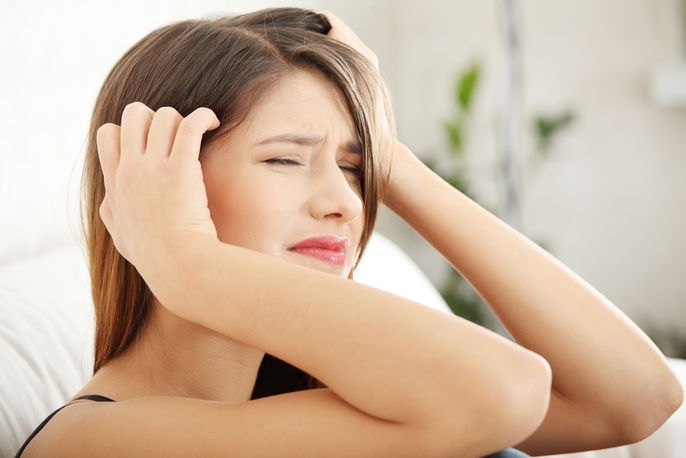What is it:
A tension headaches is a type of headache frequently experienced by women. It is caused by contraction of the neck muscles, which occurs mainly due to poor posture, stress, anxiety and lack of sleep.
This type of headache is classified in 3 subtypes, depending on its frequency:
- Infrequent tension headache: occurs 1 to 2 times per month
- Very frequent tension headaches: occurs 1 to 2 times per week
- Chronic tension headache: occurs more than 15 days per month, and can last months to years
To relieve symptoms of a tension headache, it is important to partake in activities like a relaxing massage, a hot bath, group activities or to take medications.

Main symptoms
The symptoms of a tension headache can emerge after periods of great stress or emotional or physical stress. Common symptoms include:
- Pain described as a pressure around the entire head, like putting on a tight helmet
- Pain that affects both sides of the neck or the forehead
- Pressure behind the eyes
- Excessive sensitivity in the shoulders, neck or scalp
These symptoms can last up to 30 minutes or even several hours, but they are generally mild and do not interfere with activities of daily living.
Different from a migraine, tension headaches are not accompanied by nausea or vomiting, nor do they become worse with exercise, lights or smells.
Tension headaches can emerge several times per month, although a frequency of more than 15 times in a month should be assessed by a doctor. The doctor may recommended medications that help to prevent their emergence.
Main causes
A tension headache can occur as a result of many situations that promote neck muscle contractions or stiffness, like:
- Stress
- Excess worry
- Anxiety
- Emotional tension
- Poor posture
- Hormonal changes
- Dehydration
In addition, a tension headache can emerge due to more mild conditions, like sleep changes, appetite changes or prolonged sun exposure.
Any person can develop a tension headache at any point of life and at any age, however this headache is most commonly seen in adults between 30 to 40 years of age.
How to relieve a tension headache
Treatment for a tension headache can vary depending on the underlying cause. The most effective treatment approach involves lifestyle changes that promote relaxation. Stressful situations should be avoided, and patients are advised to participate in relaxing activities like yoga or meditation.
Exercise and a balanced diet are also recommended. Other treatment options include:
1. Cold compresses on the forehead
Apply a cold compress on the forehead can promote vasodilation in the head blood vessels and reduce inflammation, relieving a headache.
2. Heat on the back of the neck
Because a tension headache can be caused by excessive stiffness in the neck, applying a warm compress can help relax these muscles and reduce headaches.
3. Scalp massage
A scalp massage is another great way to help relax and relieve tension headache symptoms. It can be done as follows:
- Keep your hair loss and bring your hands to your head, being sure to remove rings or bracelets.
- Lightly massage the scalp with the tips of your fingers, in circular movements, from the neck to the scalp.
- Hold your hair close to the roots and gently tug.
- Gently stretch your neck forward to back, and from side to side.
To boost the effect of this massage, take a hot bath after. This will allow muscles to stretch more easily to relieve accumulated tension.
4. Medications
Analgesics and anti-inflammatories are very effective for the treatment of infrequent or frequent tension headaches. Chronic tension headaches may require stronger medications, however, like sumatriptan or zolmitriptan.
5. Physiotherapy
Physiotherapy can also be an important treatment approach to help stretch the neck and head muscles. It can promote relaxation and improve circulation to the area to reduce symptoms.






























